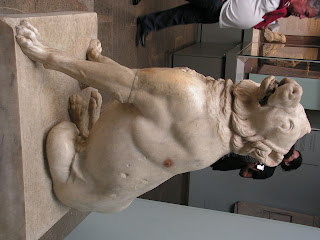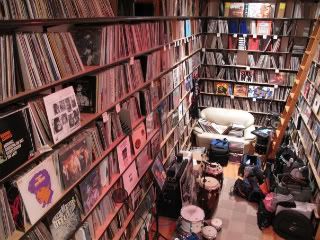I know it might seem a bit laughable-- records were mass-produced after all-- but there is still a physical component to lps: I can see the grooves where the physical waves of the music were imprinted, the visible version of the pressure music exerts on the body. I can see where songs change drastically, I can feel the silent spaces between songs with my fingers as I clean my records.
I feel the same way about books; borrowing my friend's Kindle to read a book was a disappointing experience. I missed the sensation of turning pages, of being able to see how many pages I'd read, how many I had left. It took me longer to read the book and felt less substantial. On the Kindle every font was the same, everything black and gray, a shadow world of the soul of books in their physical form. No human being will ever be able to touch a digital book, there is no history of human contact, there are no signs of past reading or cherishing.
Why is this so important? So what? It saves money and probably a few trees. (It doesn't save jobs in local shops, but that is another article. I suggest you go here for a great blog discussion on why buying music [and books for that matter] is important.)
 | |
| Irises by Van Gogh |
Why should I settle for a "3D" experience of a sculpture or painting on Google-Whatever if I can ever have the chance to see it in person? Imagining the artist staring at a piece of marble (or any other material) and conjuring a being forth is much more awe-inspiring that the distance the computer screen puts between us.

 When we allow the distance technology creates to be at the center of our lives, we are losing out. I still remember the excitement I felt as a pre-schooler when we had our weekly "mystery" tactile activity. The teacher brought an object to class in a paper bag and every student stretched out their hand in order to feel it, interact with it, try to guess the object's identity. Everything else I remember from pre-school is pretty expressionistic, but boy, I remember that paper bag.
When we allow the distance technology creates to be at the center of our lives, we are losing out. I still remember the excitement I felt as a pre-schooler when we had our weekly "mystery" tactile activity. The teacher brought an object to class in a paper bag and every student stretched out their hand in order to feel it, interact with it, try to guess the object's identity. Everything else I remember from pre-school is pretty expressionistic, but boy, I remember that paper bag.Teaching students who are BFFs with 2D experiences of life (friendships conducted through texts, all the most interesting sights on the 2" screens of their cell phones) I've found they are not immune to the mystery bag activity, or hands-on art-- in fact, these activities are the ones that bring that magical, elusive light of learning to their eyes. These activities are becoming as rare as White Tigers in young people's TV and electronic filled lives. Our culture is losing the knowledge of how to touch anything other than a keyboard or a screen (and students are losing their ability to manually write, spell, and who needs it anyway with Siri? Welcome illiteracy! Spellyng doznt hav 2 b standrdzd ineemor-- wut iz a printyng pres?).
The physical experience of buying/listening/playing music doesn't stand alone from how we interact with art in general. Technological experiences and conveniences shouldn't be at the expense of human interaction with an object. My romance with the Platonic, abstract ideal has ended. Put me in a room with the physical thing 'cause a hard drive full of music just won't cut it.

No comments:
Post a Comment